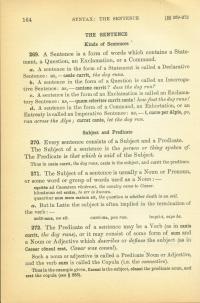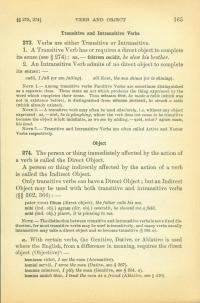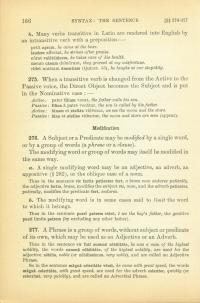269. A sentence is a form of words which contains a statement, a question, an exclamation, or a command.
a. A sentence in the form of a statement is called a Declarative Sentence.
Canis currit. The dog runs.
b. A sentence in the form of a question is called an Interrogative Sentence.
Canisne currit? Does the dog run?
c. A sentence in the form of an exclamation is called an Exclamatory Sentence.
Quam celeriter currit canis! How fast the dog runs!
d. A sentence in the form of a command, an exhortation, or an entreaty is called an Imperative Sentence.
Ī, curre per Alpīs. Go, run across the Alps.
Currat canis. Let the dog run.
Subject and Predicate
270. Every sentence consists of a subject and a predicate. The subject of a sentence is the person or thing spoken of. The predicate is that which is said of the subject. Thus in Canis currit (The dog runs), canis is the subject, and currit the predicate.
271. The subject of a sentence is usually a noun or pronoun, or some word or group of words used as a noun.
Equitēs ad Caesarem vēnērunt. The cavalry came to Cæsar.
Hūmānum est errāre. T o err is human.
Quaeritur num mors malum sit. The question is whether death is an evil.
a. But in Latin the subject is often implied in the termination of the verb.
| sedē-mus we sit | curri-tis you run | inqui-t says he |
272. The predicate of a sentence may be a verb (as in, Canis currit The dog runs), or it may consist of some form of sum and a noun or adjective which describes or defines the subject (as in Caesar cōnsul erat Cæsar was consul). Such a noun or adjective is called a Predicate Noun or Adjective, and the verb sum is called the Copula (i.e. the connective). Thus in the example given, Caesar is the subject, cōnsul the predicate noun, and erat the copula (see § 283).
Transitive and Intransitive
273. Verbs are either Transitive or Intransitive.
- A transitive verb has or requires a direct object to complete its sense (see § 274, below).
Frātrem cecīdit. He slew his brother.
- An intransitive verb does not require a direct object to complete its sense.
Cadō I fall (or am falling).
Sōl lūcet The sun shines (or is shining).Note 1— Among transitive verbs Factitive Verbs are sometimes distinguished as a separate class. These state an act which produces the thing expressed by the word which completes their sense. Thus, Mēnsam fēcit [He made a table (which was not in existence before)], is distinguished from Mēnsam percussit [He struck a table (which already existed)].
Note 2— A transitive verb may often be used absolutely, i.e. without any object expressed where the verb does not cease to be transitive because the object is left indefinite.
Arat. He is ploughing.
Quid? What (is he ploughing)?
Agrum suum. His land.Note 3— Transitive and Intransitive Verbs are often called Active and Neuter Verbs respectively.
Object
274. The person or thing immediately affected by the action of a verb is called the Direct Object. A person or thing indirectly affected by the action of a verb is called the Indirect Object. Only transitive verbs can have a direct object; but an indirect object may be used with both transitive and intransitive verbs (§ 362, § 366).
Pater vocat filium (dir. obj.).
The father calls his son.
Mihi (ind. obj.) agrum (dir. obj.) ostendit.
He showed me a field.
Mihi (ind. obj.) placet.
It is pleasing to me.
Note— The distinction between transitive and intransitive verbs is not a fixed distinction, for most transitive verbs may be used intransitively, and many verbs usually intransitive may take a direct object and so become transitive (§ 388.a).
a. With certain verbs, the genitive, dative, or ablative is used where the English, from a difference in meaning, requires the direct object (Objective).
Hominem videō. I see the man. (accusative)
Hominī serviō. I serve the man. (dative, see § 367).
Hominis misereor. I pity the man. (genitive, see § 354.a).
Homine amīcō ūtor. I treat the man as a friend. (ablative, see § 410).
b. Many verbs transitive in Latin are rendered into English by an intransitive verb with a preposition.
Petit aprum. He aims at the boar.
Laudem affectat. He strives after praise.
Cūrat valētūdinem. He takes care of his health.
Meum cāsum doluērunt. They grieved at my misfortune.
Rīdet nostram āmentiam (Quinct. 55) He laughs at our stupidity.
275. When a transitive verb is changed from the active to the passive voice, the direct object becomes the subject and is put in the nominative case.
Active: Pater fīlium vocat. The father calls his son.
Passive: Fīlius ā patre vocātur. The son is called by his father.
Active: Lūnam et stellās vidēmus. We see the moon and the stars.
Passive: Lūna et stellae videntur. The moon and stars are seen (appear).
Modification
276. A subject or a predicate may be modified by a single word, or by a group of words (a phrase or a clause). The modifying word or group of words may itself be modified in the same way.
a. A single modifying word may be an adjective, an adverb, an appositive (§ 282), or the oblique case of a noun. Thus in the sentence
Vir fortis patienter fert. A brave man endures patiently.
the adjective fortis (brave) modifies the subject vir (man), and the adverb patienter (patiently), modifies the predicate fert (endures).
b. The modifying word is in some cases said to limit the word to which it belongs. Thus in the sentence
Puerī patrem videō. I see the boy's father.
the genitive puerī limits patrem by excluding any other father.
277. A Phrase is a group of words, without subject or predicate of its own, which may be used as an adjective or an adverb. Thus in the sentence
Vir fuit summā nōbilitāte. He was a man of the highest nobility.
the words summā nōbilitāte (of the highest nobility) are used for the adjective nōbilis (noble) or nōbilissimus (very noble) and are called an Adjective Phrase.
So in the sentence
Māgnā celeritāte vēnit. He came with great speed.
the words māgnā celeritāte (with great speed) are used for the adverb celeriter (quickly) or celerrimē (very quickly) and are called an Adverbial Phrase.



